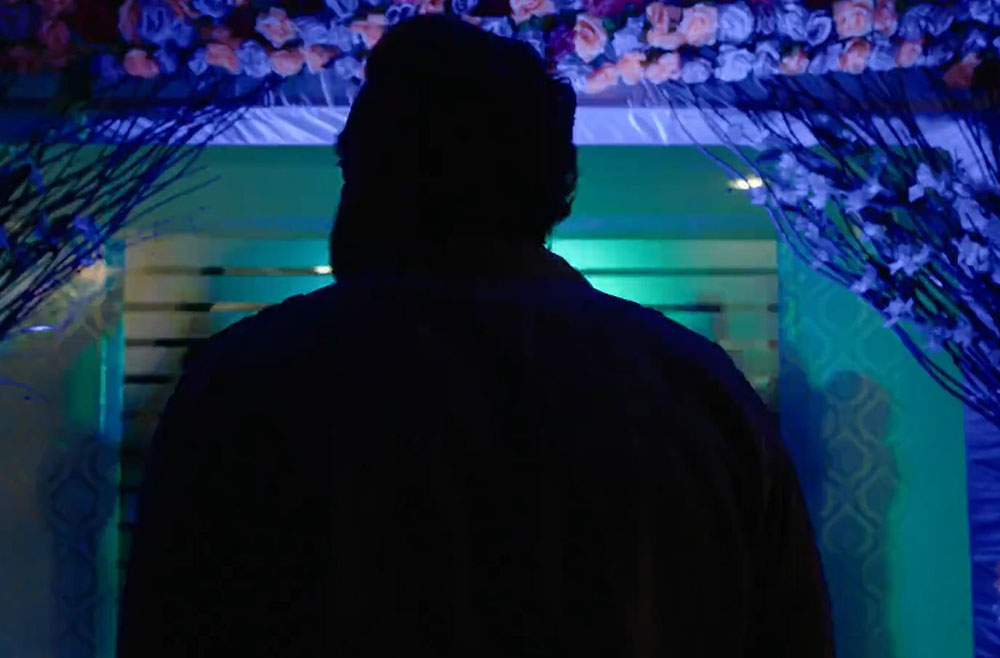In “Love Hostel,” Jyoti’s grandmother, local politician Kamala Dilawar, hires Dagal, an indiscriminate killing machine with an extremely twisted political ideology. She does this after her young granddaughter ‘brings dishonour’ to the family by eloping with Ashu/Ahmed. He is a Muslim butcher who, post his father’s arrest on false suspicions of terrorism, runs the meat shop that’s bequeathed in his possession.
What follows is a cat-and-mouse chase as Jyoti (Sanya Malhotra) and Ashu (Vikrant Massey) attempt to outrun the stealthy and ruthless bounty hunter. As the body count rises—and even their court-mandated safehouse (the titular ‘Love Hostel’) fails to protect them—the lovebirds realize they have nowhere to run or hide. They are caught in an inescapable man-made net of festering hate, with Jyoti’s narrow-minded family refusing to accept the couple’s interfaith relationship. Even the lawmakers side with those who wield the higher ground in society; i.e. definitely not Ashu’s ‘kind.’
A Sociopolitical Noir Thriller
“Love Hostel” is not your ordinary run-of-the-mill noir thriller, but rather of the sociopolitical noir genre. It sheds light on many prevalent and unfair practices. It also comments on how these practices divide communities and individuals in India, where politicians peddle secularism for votes. This society views Muslims largely as terrorists, and they become targets of Islamophobic slurs on a regular basis; we see in a scene with Ashu and a police officer at the courtroom that many treat him with a side eye and suspicion for merely running a meat shop. The latter is in fact such a harsh reality in India that owning a meat shop has led to Muslims being labelled as criminals and dragged out of their homes to be subjected to inhumane mob lynchings.
“Love Hostel” also comments on how women continue to remain oppressed by patriarchal practices. They aren’t asked for their consent for marriage; worse, they’re ostracized for remaining spinsters and shamed (or even killed) for the sake of honour when they choose to marry someone on their own accord instead of someone whom their family has picked out for them. Jyoti’s younger sibling’s violent behaviour showcases how even young minds believe this propaganda. They harbor the idea that a certain community is unworthy of love; and loving somebody not part of one’s own community/gender is a punishable offense and ‘dishonorable.’

Highlighting How Society Views the ‘Different’
A scene featuring a homosexual couple crossing paths with Ashu and Jyoti while on the run—leading to both couples sympathising with each other’s plight—also further highlights how ‘the different ones’ continue to constantly face discrimination and un-acceptance due to the narrow-mindedness that persists within certain strata of society.
“Love Hostel” is a visually pleasing movie; hues of reds and purples/magenta accompany each frame, thus oozing a stylish feel with its production design. There is never a dull moment as it launches its characters—and simultaneously its audience—into one nail-biting situation after another. The film paces evenly and the action sequences are quite slick. A blood-soaked gunfight between Ashu and his ‘clients’ during a meat delivery run gone wrong stood out for me. Like most ventures in the noir genre, “Love Hostel” also features copious amounts of moral ambiguity. It includes darkly comedic interactions that evoke nervous laughter and tension.
A Great Vikrant Massey, Sanya Malhotra, and Bobby Deol
The performances are easily this movie’s biggest strength and were enough to take my breath away. The lead trio of Vikrant Massey as the ostracized Ashu, Sanya Malhotra as the understanding and feisty love of his life Jyoti (affectionately referred to as Billo), and Bobby Deol as the gritty, monotonous, and deadly Dagal all deliver incredibly nuanced performances worthy of applause. Massey and Malhotra also share an impeccable chemistry that makes one root for their characters’ hopefully eternal romance. The minor characters, regardless of the varying amount of screen time, are equally important to the plot and character motivations; as a result, even the supporting actors deserve commendation for their performances.
The only slight deterrents of “Love Hostel” are the underdeveloped minor characters; and this further left me wanting more of this story and its characters. As a result, I felt it could have benefited from a longer run-time or worked better as a web series. Initially the plot does come across as slightly convoluted due to the various subplots that run parallel; but this is only momentary, and viewers will eventually warm up to its novel concept and extremely intriguing execution.
The ending may feel abrupt for some; but for me, it highlighted the harsh realities faced by those viewed as different, who never stand a fair chance. If you enjoy noir thrillers with haunting themes while also sparking a timely discourse on the same, then do book a stay at the unsettling ‘Love Hostel’.
“Love Hostel” is currently available to watch on ZEE5.
Support the Site: Consider becoming a sponsor to unlock exclusive, member-only content and help support The Movie Buff!